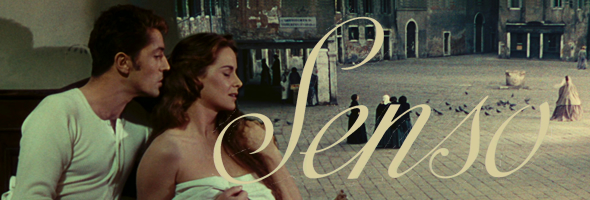
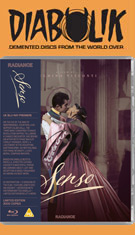

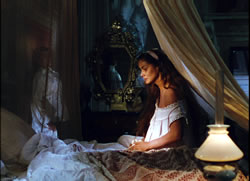 classics in world cinema, few were abused for so long as Senso, the first color film by
classics in world cinema, few were abused for so long as Senso, the first color film by  director Luchino Visconti after a trio of well-respected neorealist classics (Ossessione, La terra trema, Bellissima). The break in style here is obvious from the opening scene as he dives headfirst into lush, operatic melodrama with the ill-fated romance of Livia Serpieri (Lisa and the Devil's Valli), a married Italian countess, and an unattached Austrian soldier, Lieutenant Franz Mahler (Strangers on a Train's Granger), who meet while attending a Verdi opera in Venice. Italy's occupation of Algeria is nearing its end in 1866, and their illicit affair causes more than a few problems which led to resentment, treachery, and ultimately tragedy.
director Luchino Visconti after a trio of well-respected neorealist classics (Ossessione, La terra trema, Bellissima). The break in style here is obvious from the opening scene as he dives headfirst into lush, operatic melodrama with the ill-fated romance of Livia Serpieri (Lisa and the Devil's Valli), a married Italian countess, and an unattached Austrian soldier, Lieutenant Franz Mahler (Strangers on a Train's Granger), who meet while attending a Verdi opera in Venice. Italy's occupation of Algeria is nearing its end in 1866, and their illicit affair causes more than a few problems which led to resentment, treachery, and ultimately tragedy.
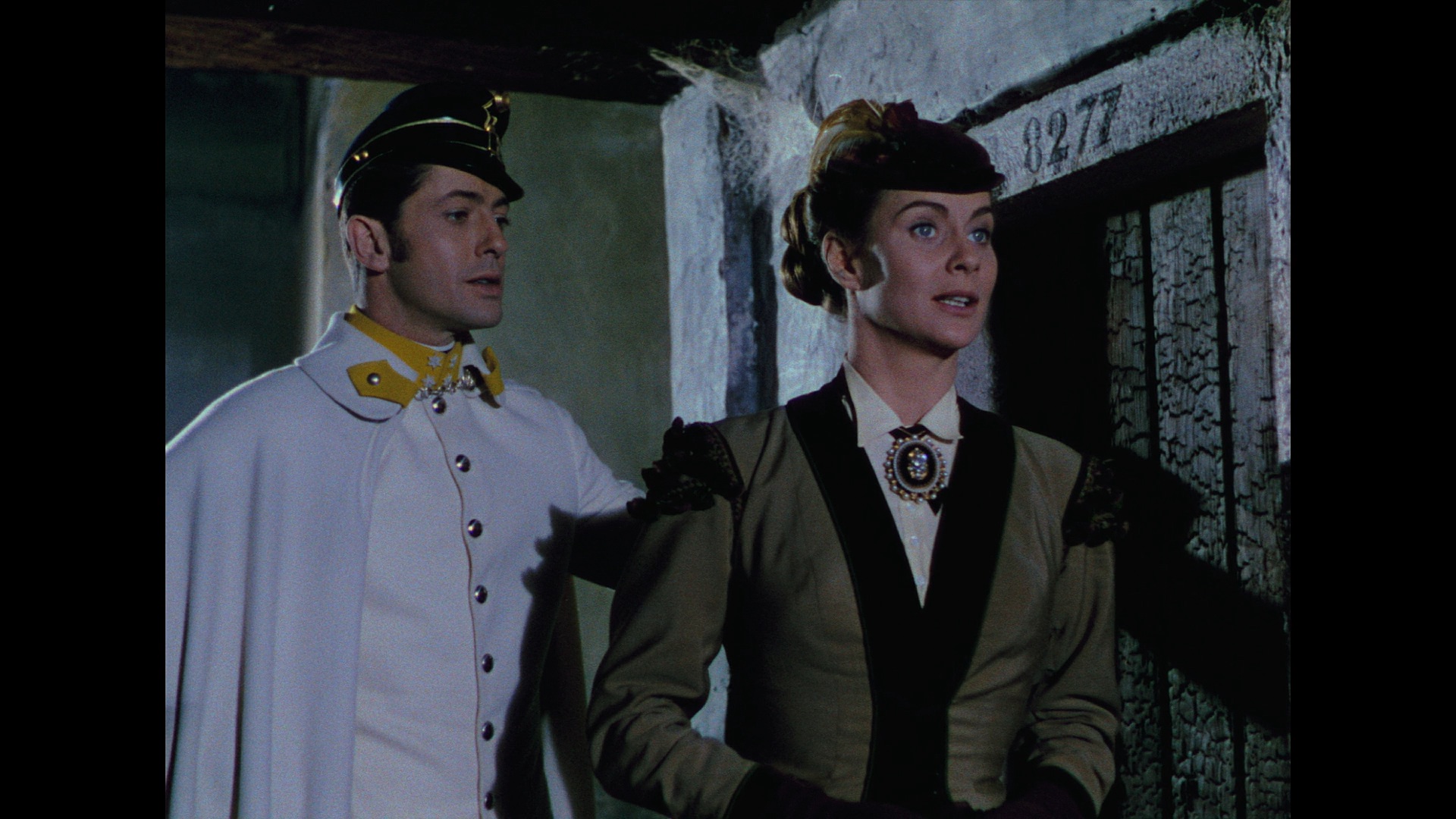 company
company 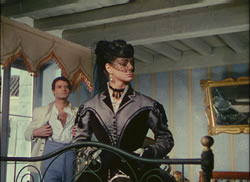 as The Wanton Contessa, which was almost half an hour shorter. This fate seems odd given that this film was oddly targeted for major international appeal, particularly with the presence of Granger and its credited "dialogue collaboration" with Tennessee Williams and Paul Bowles.
as The Wanton Contessa, which was almost half an hour shorter. This fate seems odd given that this film was oddly targeted for major international appeal, particularly with the presence of Granger and its credited "dialogue collaboration" with Tennessee Williams and Paul Bowles.
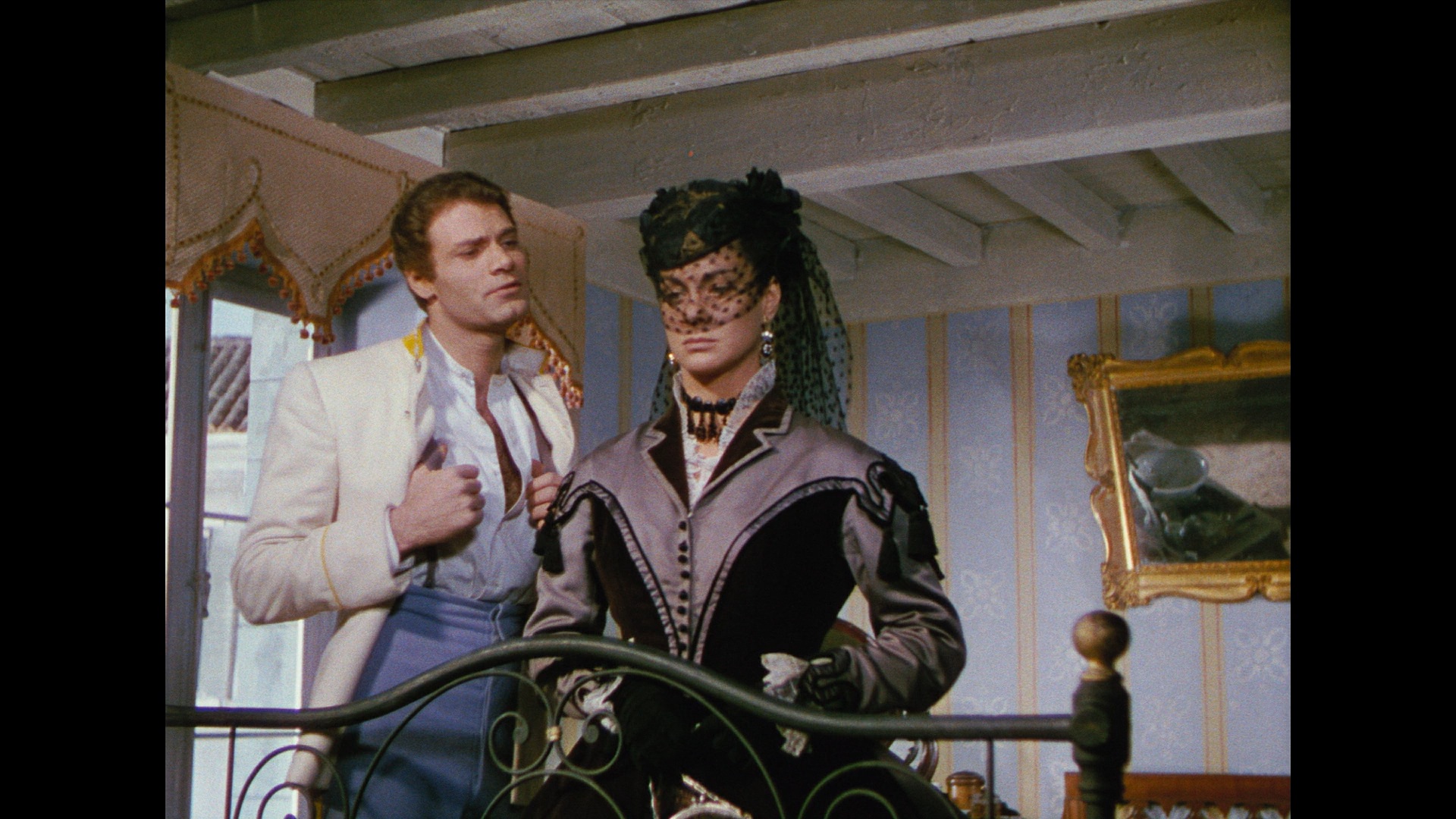 as is complete with that tan and teal virus that afflicts so many Italian and French-sourced scans. The main feature is presented in DTS-HD MA 2.0 Italian mono audio with optional English subtitles, but just as fascinating is the inclusion here of The
as is complete with that tan and teal virus that afflicts so many Italian and French-sourced scans. The main feature is presented in DTS-HD MA 2.0 Italian mono audio with optional English subtitles, but just as fascinating is the inclusion here of The 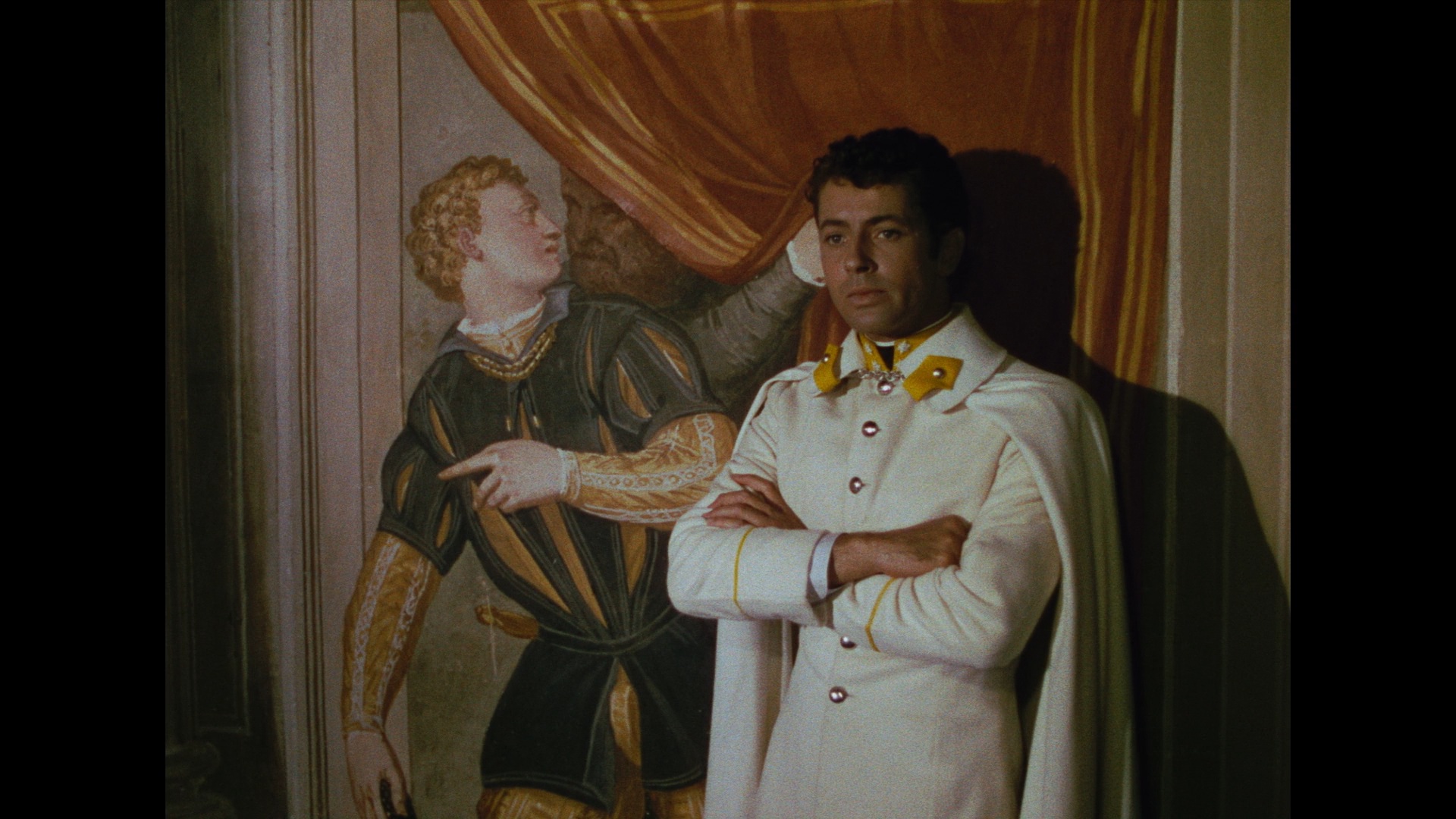 Wanton Contessa, which was out of public circulation for decades. Though obviously much shorter and sporting a less impressive HD transfer (from the Harvard Archives, no less), it was great to finally see this legendary 94-minute variant complete with Valli and Granger using their own voices in English (the language in which they played their scenes together). It's also a nice opportunity to officially hear some of the Williams/Bowles contributions, too.
Wanton Contessa, which was out of public circulation for decades. Though obviously much shorter and sporting a less impressive HD transfer (from the Harvard Archives, no less), it was great to finally see this legendary 94-minute variant complete with Valli and Granger using their own voices in English (the language in which they played their scenes together). It's also a nice opportunity to officially hear some of the Williams/Bowles contributions, too.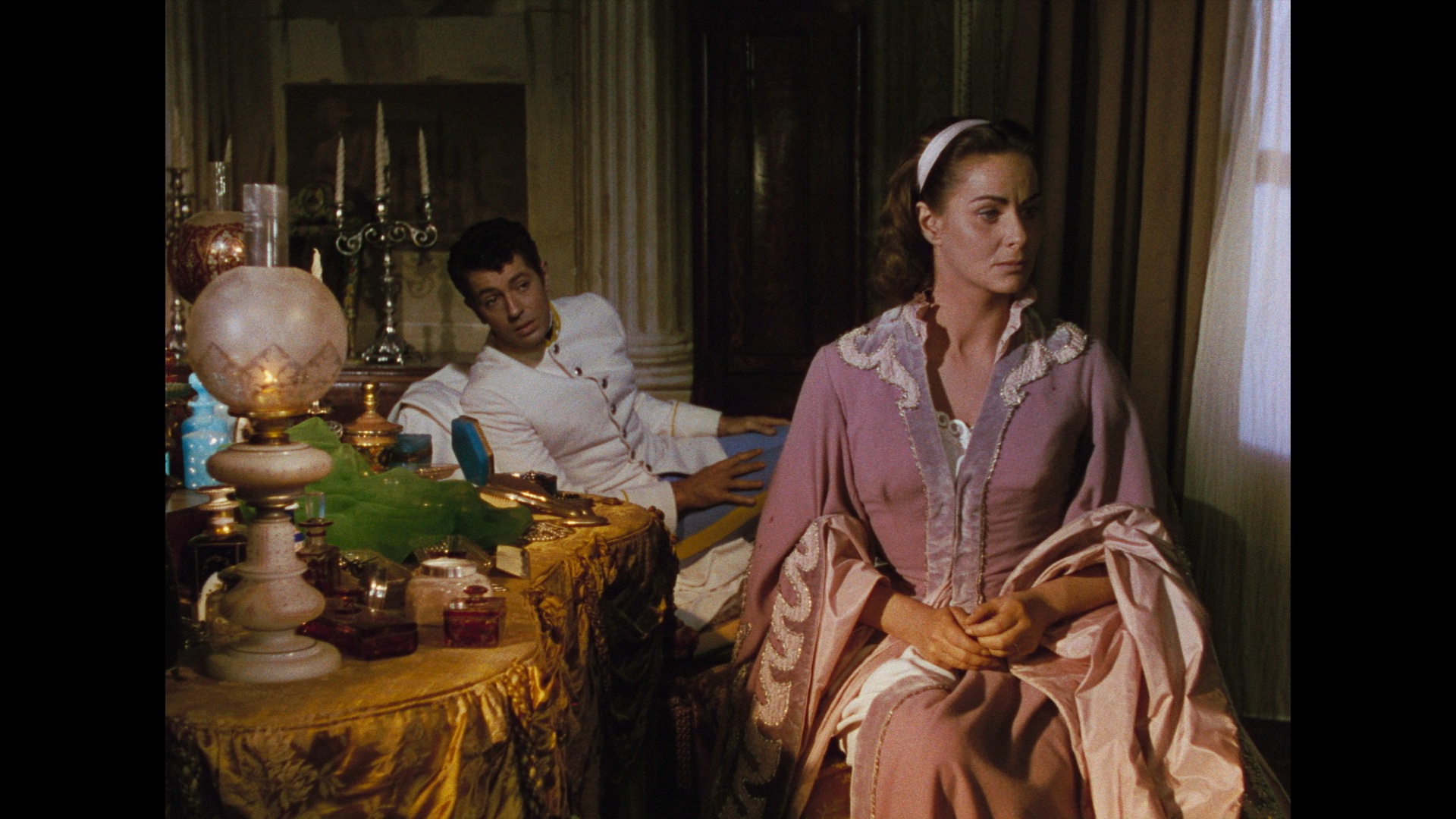 done a major color correction overhaul that snaps everything back into a vibrant Technicolor look with actual whites and reds finally restored; it's easily the best viewing option out there to date. In an interesting touch, the second disc is
done a major color correction overhaul that snaps everything back into a vibrant Technicolor look with actual whites and reds finally restored; it's easily the best viewing option out there to date. In an interesting touch, the second disc is  devoted to an alternate presentation framed at 1.66:1, which is workable enough and justifiable since this was released around the time films were being shot to be projected in both Academy and various wider ratios. Unless you really want to fill up your screen as much as possible, most will probably prefer the 1.33:1 as it features more vertical information and shows off more of those gorgeous costumes and locations. Either way, the LPM 1.0 mono audio sounds solid and features excellent optional English subtitles. The first disc houses all of the bonus features including a welcome new viewing option, the English-language version in a much longer edit (now 121 minutes, just a bit shy of the Italian cut) including as much footage from the uncut restoration as possible. It's a nice touch and a much richer way to experience this version, which is always great to see for the native vocal performances of the two stars (even if it still doesn't make much sense for Valli to have a thick Italian accent when everyone else speaks like an American!). With a video history reaching back to a 1999 DVD release from Image Entertainment, the 1999 Carlo Lizzani documentary Luchino Visconti (60m35s) is included here and makes for a solid primer on his life and career with interview subjects including Claudia Cardinale, Burt Lancaster, Francesco Rosi, and Lizzani himself, plus lots of film clips. Wearing a great jacket, critic and fashion historian Matteo Augello appears for a 18m59s discussion of fashion and overall style sense in Visconti including his fastidious attention to detail and love of sensory aesthetics. An entertaining black-and-white 1969 interview with Visconti and the legendary Maria Callas (23m10s) from the series L'invité du dimanche is basically a casual conversation between friends about how they first met at a party, their collaborations together on several opera productions, their own theories on why opera should never be filmed, and the way it's used in his films with this one in particular. A stills gallery is also included, and the limited edition comes with a booklet featuring a new essay by Christina Newland.
devoted to an alternate presentation framed at 1.66:1, which is workable enough and justifiable since this was released around the time films were being shot to be projected in both Academy and various wider ratios. Unless you really want to fill up your screen as much as possible, most will probably prefer the 1.33:1 as it features more vertical information and shows off more of those gorgeous costumes and locations. Either way, the LPM 1.0 mono audio sounds solid and features excellent optional English subtitles. The first disc houses all of the bonus features including a welcome new viewing option, the English-language version in a much longer edit (now 121 minutes, just a bit shy of the Italian cut) including as much footage from the uncut restoration as possible. It's a nice touch and a much richer way to experience this version, which is always great to see for the native vocal performances of the two stars (even if it still doesn't make much sense for Valli to have a thick Italian accent when everyone else speaks like an American!). With a video history reaching back to a 1999 DVD release from Image Entertainment, the 1999 Carlo Lizzani documentary Luchino Visconti (60m35s) is included here and makes for a solid primer on his life and career with interview subjects including Claudia Cardinale, Burt Lancaster, Francesco Rosi, and Lizzani himself, plus lots of film clips. Wearing a great jacket, critic and fashion historian Matteo Augello appears for a 18m59s discussion of fashion and overall style sense in Visconti including his fastidious attention to detail and love of sensory aesthetics. An entertaining black-and-white 1969 interview with Visconti and the legendary Maria Callas (23m10s) from the series L'invité du dimanche is basically a casual conversation between friends about how they first met at a party, their collaborations together on several opera productions, their own theories on why opera should never be filmed, and the way it's used in his films with this one in particular. A stills gallery is also included, and the limited edition comes with a booklet featuring a new essay by Christina Newland.Radiance (Blu-ray) 1.33:1
Radiance (Blu-ray) 1.66:1
Criterion (Blu-ray)
![]()